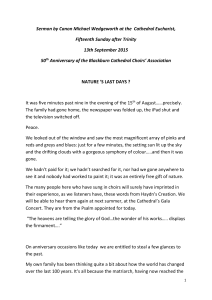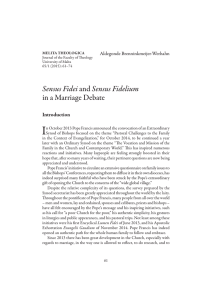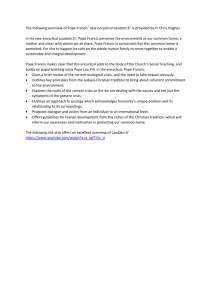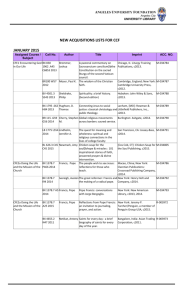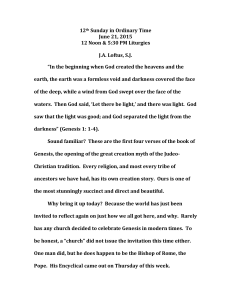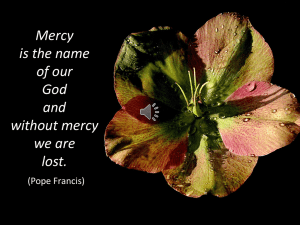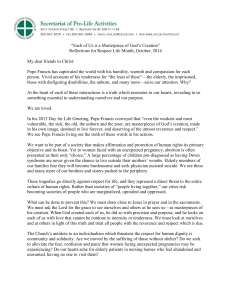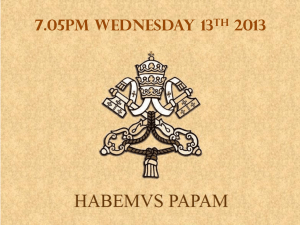The Humble Pulpit Leadership Lessons from Pope Francis Jeffrey A. Krames
advertisement
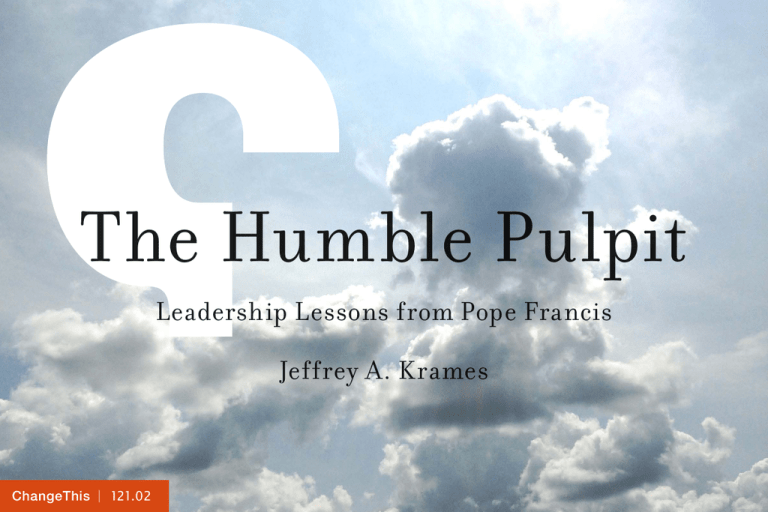
The Humble Pulpit Leadership Lessons from Pope Francis Jeffrey A. Krames ChangeThis | 121.02 Most people do not view Pope Francis as a great leader. Wait—scratch that. Most people do not view Pope Francis as a leader! Not at first thought, in any event. I know this due to an unscientific, informal, eight-month survey I conducted while I was writing a book on Francis. Let me explain. Since the “a-ha” moment hit me in February of 2014, when I awoke at 2 a.m. one morning with the idea to marry the concepts of Pope Francis & leadership lessons, I have asked approximately 250 people who each felt was the “best leader in the world.” I asked adults of all ages, religions, education-levels, socio-economic positions, etc. I even gave some initial hints to every person I spoke with: I said that that this person was not based in the United States, was not a leader of a country or a corporation in the traditional sense, and that the person was still living and doing a great job. The result? ChangeThis | 121.02 Crickets. Not a single person answered “the pope” or “Pope Francis.” And I asked this question after Francis was declared “Person of the Year” by TIME Magazine, and after Fortune Magazine named Francis “World’s Greatest Leader.” The most common answer, when I got one (more than a third of the participants could not think of any answer), was “Mandela.” I quickly explained that he was dead. “Oh, yeah, I forgot,” most retorted. What was the second most popular answer? “The Dalai Lama.” I tell this story to convey how people think, or more precisely do not think, about leadership in today’s 21st century, turbulent global arena. “ Since Jorge Mario Bergoglio became Pope Francis in March of 2012, he has shown the world a new way to lead. Not with bluster or bravado, but with humility and humanity. ChangeThis | 121.02 The Humility Imperative As someone who has studied leaders and the topic of leadership for more than three decades, I have long since believed that humility is the most under-rated of all leadership qualities. As a member of the publishing community for the same length of time, I have been baffled that no (commercial) publisher has ever published a book that instructs managers, leaders, and aspiring leaders how to become more humble. However, this should not come as a big surprise. That’s because there has not been an inspiring, humble figure that could be used as a shining example of this key leadership quality. Until now. Since Jorge Mario Bergoglio became Pope Francis in March of 2012, he has shown the world a new way to lead. Not with bluster or bravado, but with humility and humanity. He has, without a doubt, emerged as the most humble leader on the world stage. There isn’t even a close second. The aforementioned anecdote is revealing, but the purpose of this manifesto is to reveal the man behind the humility. There is much more to Pope Francis than humility. We will take a deep dive, beyond the frock and circumstance, and reveal the DNA of something so rare today on the world’s stage—a truly authentic leader who lives, and leads, by example in every facet of his position. ChangeThis | 121.02 The “Leadership Pope” Revealed Several interviewers have asked me what were the biggest surprises I learned while researching Mario Jorge Bergoglio (now Pope Francis). Given the richness of the subject, it will come as no surprise that I learned many new things about this enigmatic and inspiring leader. Perhaps the single most surprising thing I discovered about Pope Francis is that he made a conscious decision to become humble. By his own admission, humility was not something that came naturally to him. He is the first to admit that he is himself is a sinner with an “authoritarian streak.” That is important, because it instills hope in other leaders and aspiring leaders that they, too, can at least learn to become a little more like this avuncular, remarkably effective figure. Another surprising—and more pertinent—fact about Francis is that he is an authentic intellectual who has a great deal to teach leaders in the world of business. This was welcome news for obvious reasons (given the book I was writing), and particularly interesting in light of the conventional wisdom that Pope Francis is both anti-capitalism and anti-business. Neither of those two widely held beliefs are true, as we will explore in depth as we take a closer look at some of Francis’ leadership ideas and methods. Most people do not know that Pope Francis has called business a “noble” profession. ChangeThis | 121.02 He is a pragmatist, and understands that the world needs business and industry to make the world go around. However, he has expressed disdain for “careerists” and “managers.” This is where many people get Francis wrong—a case of something that literally gets lost in translation. He does not dislike all managers, or even most managers. Francis has little use for bureaucrats or pencil pushers who stay locked in their offices barking out orders while the real leaders are out on the streets and in the alleys of their parishes tending to their “flocks.” This characterization reminds me of how former GE chairman and CEO Jack Welch described managers as bureaucrats. He argued that managers are the opposite of leaders. Managers “control” and ”stifle,” while leaders inspire and create a clear path forward and an even clearer picture of the finish line. The other business thinker that Pope Francis evokes is the late management giant, Peter Drucker. This is where Francis really shines. “ Francis may be a self-described “sinner”… but he is, without question, the right man for the right job at the right time. ChangeThis | 121.02 How Francis Thinks Like Drucker Peter Drucker is widely regarded as “the father of modern management,” so how does this Pontiff resemble management guru Peter Drucker? Both exuded great humility, and both brought a similar mindset to the role of business and commerce in society. In 2003, while researching a book on Drucker, I had the good fortune to spend time with Dr. Drucker. In researching Pope Francis, I was delighted to discover whole passages in which these two larger-than-life figures reveal their similarities. While working on the Drucker book, I knew that I was not the not the first author to compare leadership in the Church with leadership in other institutions—such as corporations, non-profits, or any other type of organization. Drucker was the pioneer in positing the church as an institution in great need of effective leadership. Let’s turn the clock back more than half a century to set the scene. Peter Drucker’s first business book, Concept of the Corporation [1946] was based on the first large-scale study of a large corporation, General Motors, and it set the standard for the thousands of business books that would be published in the decades that followed (most published after 1980). Many of the ideas in Concept are as relevant today as they were when they were written nearly seven decades ago. Let’s look at a few examples, and see if we can discern the intersection of Drucker and Pope Francis in their thinking and reasoning. In Concept of the Corporation, Drucker wrote that: ChangeThis | 121.02 “Any society needs institutions which by their very nature cannot be related to social goals. This is, for instance, true of the family which finds its purpose in the biological survival of man, and which is thus a condition of society rather than conditioned by it; and the same is true of a church whose kingdom is not of this world, and which therefore transcends society.” Drucker did not stop there. He added something that could have been written by Pope Francis himself today: “If a social institution operates in such a manner as to make difficult or impossible the attainment of the basic ethical purposes of society it will bring about a severe political crisis …” Drucker continued, “What is often overlooked is that equality of opportunity and the human dignity of status and function stand in a very peculiar relationship to each other.” These sentiments are echoed by Pope Francis, who wrote: “It is vital that government leaders and financial leaders take heed and broaden their horizons, working to ensure that all citizens have dignified work, education, and healthcare.” Pope Francis also commented on the shifting of social structures: “Changing structures without generating new convictions and attitudes will only ensure that those same structures will become, sooner or later, corrupt, oppressive, and ineffectual.” In his book Managing in a Time of Great Change, Drucker also wrote about the changing ways of structures: “It is hard to fight [structural trends] in the short-term and almost hopeless in ChangeThis | 121.02 the long-run. When such a structural trend peters out or when it reverses itself … those who continue as before face extinction …” He continued, “the tremendous increase in wealthproducing capacity … has been spent on greater leisure, on health care, and on education.” Here again is Pope Francis: “The renewal of structures demanded by pastoral conversion can only be understood in this light: as part of an effort to make them more mission-oriented, to make ordinary pastoral activity on every level more inclusive and open …” Lastly, in early 2014, Francis urged global leaders gathered in Davos, Switzerland, to consider their broader roles in the world order: “I ask you to ensure humanity is served by wealth, and not ruled by it.” It is remarkable that many of Drucker’s writings so closely resemble many of the thoughts and beliefs espoused by Pope Francis today. Both of these figures share other similarities as well, much having to do with their humility: Both men are self-effacing, both lived well within their means, and both are superb thinkers. Even their writing styles—somewhat formal in nature— are similar. In fact, having studied the vast majority of the great CEOs of the late twentieth century, I can think of no business leader who writes more thoughtfully about the global nature of business and wealth than Pope Francis. That is why his words—and actions—carry so much weight. ChangeThis | 121.02 For example, when one takes into account the Great Recession of 2008–9, against the backdrop of a global crisis of increasing income inequality, it is difficult to argue with this statement made by the pope: “Some people continue to defend trickle-down theories which assume that economic growth, encouraged by a free market, will inevitably succeed in bringing about greater justice and inclusiveness in the world.” Francis may be a self-described “sinner”—to quote Pope Francis: “A religious who recognizes himself as weak and a sinner does not negate the witness he is called to give, rather he reinforces it, and this is good for everyone” —but he is, without question, the right man for the right job at the right time. And the planets seldom align themselves as neatly as they have for this modest, yet brilliant figure. “ How does this Pontiff resemble management guru Peter Drucker? Both exuded great humility, and both brought a similar mindset to the role of business and commerce in society. ChangeThis | 121.02 Not Anti-Capitalism, Anti-Greed There is far more to Francis than humility. He is a shrewd operator, already ridding the Curia (the Vatican’s bureaucracy) of the leaders he believes are most fixated on the ways of yesterday, those who might interfere with his agenda of creating a more inclusive and open Church focused on meeting the needs of all people. It is no accident that one of Pope Francis’s best books, On Heaven and Earth, was coauthored with a well-known Argentine Rabbi, Rabbi Abraham Skorka. It is also no accident that the book promotes itself by discussing how Bergoglio and Skorka spent years “building bridges among Catholicism, Judaism, and the world at large.” For example, as Pope, Francis challenges the ultra-conservatives in the Church to be ultrainclusive of people whom other popes never bothered to embrace: He washes the feet of prisoners (including two women, which caused no small amount of controversy with Church elders. No pope had washed the feet of women); he also embraced a man with boils whom few of us would ever approach, never mind embrace. Pope Francis despises waste and displays of great wealth, especially among members of the clergy, and he backs that sentiment with action. In late 2013, Pope Francis temporarily “expelled” a German bishop because he had the gall to spend an astronomical €31 million to ChangeThis | 121.02 erect a new, ostentatious home. An investigation was ordered to determine the ultimate future of the bishop labeled the “bling bishop.” By the end of March of 2014, The German “bling bishop” was “removed” from his diocese permanently. This was a textbook case of an “employee” who acted in a way 180 degrees contrary to the boss’s values, which should never be tolerated (and wasn’t in this case). Pope Francis sees no place in the Church for such spendthrifts, especially when so many in the world are in so much need. Indeed, it is this quote from Pope Francis that embodies his view of the world: “How can it be that it is not a news item when an elderly homeless person dies of exposure, but it is news when the stock market loses two points?” That’s him—in a single sentence. Pope Francis shows us where the world has gone wrong and how our values have gone off the rails. Even the choice of his name—inspired by St. Francis of Assisi—was meant to signal to the world that he would focus on society’s poor, as well as on the sickest and weakest among us. Saint Francis of Assisi, who served as Pope in the early part of the thirteenth century, became known as the patron Saint of animals and the ecology. Despite the fact that his father was wealthy, St. Francis gave up all that he once possessed, even his clothes, which he presented to his “earthly” father, all in an effort to follow the words of Jesus, who said: “Possess no ChangeThis | 121.02 gold or silver or copper in your purses, no traveling bag, no sandals, no staff.” St. Francis of Assisi would likely approve of the contemporary Pope Francis. However, Pope Francis’s comment about the homeless and the Dow is a double-edged sword: In addition to revealing something important about Francis, is also reveals the greatest challenge of writing a leadership book about this singular figure. Francis has been criticized for his anti-capitalistic tendencies. Although it might seem like semantics, Pope Francis is not anti-industry. He is, however, a harsh critic of large corporations that rack up billions in profits while laying off or firing thousands of workers: “The economy can no longer turn to remedies that are a new poison,” wrote Francis, “such as attempting to increase profits by reducing the work force and thereby adding to the ranks of the excluded.” Why not interpret the pope’s rhetoric as anti-business? In the same homily in which he writes of the “excluded,” he writes of the nobility of business and specifically of businesses that set out to make our world a better place to live: “Business is a vocation, and a noble vocation, provided that those engaged in it see themselves challenged by a greater meaning in life; this will enable them truly to serve the common good by striving to increase the goods of this world and to make them more accessible to all … I am convinced of one thing: the great changes in history were realized when reality was seen not from the center but rather from the periphery.” ChangeThis | 121.02 So, despite all the pundits who have criticized Pope Francis for his anti-business leanings, those criticisms are either simplistic or incomplete—and in some cases just wrong. However, Francis is certainly anti-greed and, more to the point, anti-income-inequality. Pope Francis speaks eloquently on the topic of the underlying reasons for the increasingly pervasive problem of income inequality. “A new tyranny is thus born, invisible and often virtual, which unilaterally and relentlessly imposes its own laws and rules … The thirst for power and possessions knows no limits. In this system, which tends to devour everything which stands in the way of increased profits, whatever is fragile, like the environment, is defenseless before the interests of a deified market, which becomes the only rule.” “ Business is a vocation, and a noble vocation, provided that those engaged in it see themselves challenged by a greater meaning in life. — pope francis ChangeThis | 121.02 Denying the thirst for power and possessions is just one reason why Pope Francis rebukes members of the clergy who drive new, expensive cars, urging them instead to buy used cars and donate the sticker-price difference to hungry, homeless children. Pope Francis’s desire to minister to the needy is certainly a goal with merit, and the Pontiff has the statistics on his side to prove his point. In early 2014, Oxfam, the controversial, anti-poverty organization operating in more than 90 countries, revealed an near-unbelievable fact: The 85 richest people in the world have more money than all of the 3.5 billion poorest people on the planet combined. That means that the 1percent of the richest people in the world control 46 percent—nearly half—of the world’s wealth. With numbers like those, who could blame this Pope for asking the wealthiest among us to give more? However, that still doesn’t diminish the difficulty of writing an authentic and helpful business/ leadership book centered around a figure whose greatest goal is leveling the economic playing field. And to make sure there is no confusion, this is the definition of leadership that I use when I write about leaders and leadership: Leadership is the ability to articulate a vision and get others to carry it out. ChangeThis | 121.02 It is not without irony that this definition was originally espoused by the leader of one of the world’s largest and oldest corporations, a leader who fired more than 125,000 workers—a practice Francis condemns: former General Electric’s CEO Jack Welch (who was named “Manager of the Century” by Fortune magazine and is the subject of several books I have authored and edited). Jack Welch and Pope Francis, while disagreeing fiercely on many things, would agree on some other important leadership tenets. For example, Welch liked to compare his $100 billion corporation to a corner grocery store. That is, he wanted all of his people to know both the products on their shelves and their customers intimately. Welch and Pope Francis also would agree on this important business principle: One of the hallmarks of any leader is how he or she leads by example. This is where Pope Francis shines. He leads a simpler life than perhaps any of his predecessors, driving what he calls a “modest” car —a Ford Focus. Before he was Pope, he was known to take public transportation and lived in a small apartment in Buenos Aires. After he became Pope, he had the Papal throne removed from the Vatican and chose to live in a two-bedroom apartment rather than something far more opulent. Francis lives by a set of values that consistently places others before him, viewing his leadership role as a servant. “Let us never forget that authentic power is service,” proclaimed Pope Francis during his Inaugural Mass. Service is a theme that is repeated often by Pope Francis, especially in his own books and homilies. ChangeThis | 121.02 Pope Francis is a complex, multi-faceted leader that is guided by one overriding priority. Peter Drucker said he never met an executive who could focus on more than one priority at a time, so here again we see Francis living by the Drucker playbook. What is Francis’s top priority? To make his organization, the Catholic Church, a more open and welcoming institution in which all in society are welcome (except the mafia. He bravely ex-communicated the mafia in July of 2014). He wants to lead the Church of “yes” rather than the Church of “no.” That means welcoming the people that have been relegated to society’s dust heap. “ I ask you to ensure humanity is served by wealth, and not ruled by it. — pope francis ChangeThis | 121.02 Info BUY THE BOOK | Get more details or buy a copy of Lead With Humility. ABOUT THE AUTHOR | Jeffrey A. Krames is the CEO and president of JK Literary Services, a publishing & literary agency that specializes in leadership, management, and other business-related works. In a career that has spanned more than 33 years, Krames served as editor-in-chief of Portfolio, the business book division of Penguin, and Vice President and Publisher of McGraw-Hill’s trade business books division. Krames has personally edited and published more than 400 business books, including many award-winning, best-selling titles on business luminaries that include Jack Welch, Michael Ovitz, Ross Perot, William Paley, Michael Dell, Bill Gates, Herb Kelleher and Lou Gerstner among others. ➔ SEND THIS | Pass along a copy of this manifesto to others. ➔ SUBSCRIBE | Sign up for e-news to learn when our latest manifestos are available. This document was created on September 24, 2014 and is based on the best information available at that time. The copyright of this work belongs to the author, who is solely responsible for the content. This work is licensed under the Creative Commons Attribution-NonCommercial-NoDerivs License. To view a copy of this license, visit Creative Commons or send a letter to Creative Commons, 559 Nathan Abbott Way, Stanford, California 94305, USA. Cover image from Stauber Design Studio. You are given the unlimited right to print this manifesto and to distribute it electronically (via email, your website, or any other means). You can print out pages and put them in your favorite coffee shop’s windows or your doctor’s waiting room. You can transcribe the author’s words onto the sidewalk, or you can hand out copies to everyone you meet. You may not alter this manifesto in any way, though, and you may not charge for it. ChangeThis | 121.02 About ChangeThis ChangeThis is a vehicle, not a publisher. We make it easy for big ideas to spread. While the authors we work with are responsible for their own work, they don’t necessarily agree with everything available in ChangeThis format. But you knew that already. ChangeThis is supported by the love and tender care of 800-CEO-READ. Visit us at 800-CEO-READ or at our daily blog. ChangeThis | 121.02
